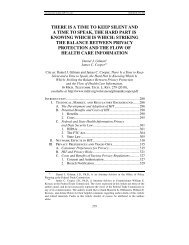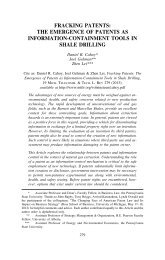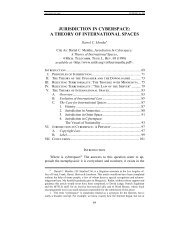the chinese regulatory licensing regime for pharmaceutical products
the chinese regulatory licensing regime for pharmaceutical products
the chinese regulatory licensing regime for pharmaceutical products
Create successful ePaper yourself
Turn your PDF publications into a flip-book with our unique Google optimized e-Paper software.
420 Michigan Telecommunications and Technology Law Review [Vol. 15:417<br />
Pharmaceutical Administration. 8 Designed to protect <strong>the</strong> public health,<br />
<strong>the</strong> provisions defined “new drugs,” stipulated new drug approval procedures,<br />
including clinical trial requirements, and established <strong>the</strong> Drug<br />
Approval Committee. 9 In order to provide more detailed rules <strong>for</strong> new<br />
drug approval, <strong>the</strong> Ministry of Health and <strong>the</strong> Ministry of Chemical Industry<br />
jointly issued Interim Provisions of New Drug Administration in<br />
1965. 10 However, <strong>the</strong> Cultural Revolution, which lasted from 1966 to<br />
1976, prevented <strong>the</strong>se regulations from being en<strong>for</strong>ced. 11<br />
In 1978, <strong>the</strong> State Council issued <strong>the</strong> Pharmaceutical Regulation,<br />
which governed clinical trials and new drug approvals. 12 Also in that<br />
year, <strong>the</strong> Ministry of Health published <strong>the</strong> New Drug Regulation to aid<br />
<strong>the</strong> implementation of <strong>the</strong> Pharmaceutical Regulation. 13 The New Drug<br />
Regulation re-defined and categorized new drugs. 14 Moreover, it also instituted<br />
more detailed rules <strong>for</strong> laboratory research, clinical trials, sample<br />
tests, approval, and <strong>the</strong> manufacturing process. 15 However, its en<strong>for</strong>cement<br />
remained problematic. 16<br />
Under <strong>the</strong> regulation, <strong>the</strong> provincial<br />
departments of health had authority to grant market authorization <strong>for</strong><br />
most new drugs, and no unified national standard existed <strong>for</strong> new drug<br />
approval. 17 Local <strong>pharmaceutical</strong> manufacturers were not required to test<br />
new drugs; authorization from <strong>the</strong> provincial department of health was<br />
easily obtained without it. 18 Accordingly, some of <strong>the</strong> marketed drugs<br />
were of poor quality and efficacy. 19<br />
In <strong>the</strong> early 1980s, China’s government began placing more importance<br />
on drug regulation. The Drug Administration Law of <strong>the</strong> People’s<br />
Republic of China was adopted in 1984, <strong>the</strong> country’s first comprehensive<br />
legislation regulating <strong>the</strong> research, production, and distribution of<br />
drugs; in 2001, a revised version of <strong>the</strong> legislation came into effect, <strong>the</strong><br />
8. Chinese Soc’y <strong>for</strong> Clinical Oncology, New Drug Administration and GCP Development<br />
in China, http://www.csco.org.cn/gcp/class/zhn005.htm (last visited Apr. 7, 2009).<br />
9. Id.<br />
10. Id.<br />
11. Id.<br />
12. Pharmaceutical Regulation (promulgated by <strong>the</strong> State Council, July 29, 1978, effective<br />
July 29, 1978) ch. 3 (P.R.C.), available at http://law.lawtime.cn/d550697555791.html/<br />
pos=0.<br />
13. New Drug Regulation (promulgated by <strong>the</strong> Ministry of Health, Feb. 19, 1979, effective<br />
Feb. 19, 1979) (P.R.C.), available at http://law.lawtime.cn/d551461556555.html.<br />
14. Id. art. 1.<br />
15. Id. arts. 2–8, 11–12.<br />
16. Chinese Soc’y <strong>for</strong> Clinical Oncology, supra note 8.<br />
17. Id.<br />
18. Rongling Deng & Kenneth I. Kaitin, The Regulation and Approval of New Drugs in<br />
China, 37 Drug Info. J. 29, 29 (2004).<br />
19. Chinese Soc’y <strong>for</strong> Clinical Oncology, supra note 8.






